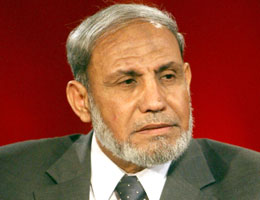December 13-2013

. . . but what aid?
The Palestinian Hamas movement says it has resumed relations with Iran after a break of two years caused by a disagreement over Syria.
The decision is potentially important for Hamas, which depended heavily on aid from the Islamic Republic and had suffered mightily as Iran severely reduced its monthly payments to Hamas, which has run Gaza since 2006 and needs the aid payments to keep Gaza running.
“Relations between Hamas and Iran have resumed,” Mah-moud Zahar, a senior member of the Islamist group, told a news conference in Gaza Monday.
Hamas had refused to support the government of Bashar al-Assad after the uprising against him broke out in March 2011. The Islamic Republic, which strongly backs Assad, objected to Hamas’s distance and greatly reduced but reportedly did not totally halt its financial payments to Hamas.
Hamas is a Sunni group that is the Muslim Brotherhood organization in Palestine. Iran had supported it because it was the most active Palestinian group in opposing Israel, but Iran distanced itself when Hamas emphasized its Sunni aspect when dealing with Assad,
Zahar told the press conference that Hamas had changed its policy on Syria and that had healed the split with Iran.
He did not say that Hamas was now supporting Assad, but rather that Hamas was neutral about the Syrian civil war. He said, “Hamas has withdrawn from Syria so that it cannot be identified with this or that side. We’ve confirmed that we are not interfering in the Syrian case, or in any other Arab country.”
But that wasn’t really anything new. In the past, Hamas members had been critical of Assad for his violent suppression of the uprising, but the organization had never taken any role in the fighting. Hamas has said for many years that its raison d’etre is opposition to Israel and it would not be sidetracked by other issues.
Zahar did not say anything about the funding Hamas received from Iran and whether it has gone back to previous levels.
The split erupted in the summer of 2011. Last May, Ghazi Hamad, Hamas’s deputy foreign minister, told the Daily Telegraph of London that Tehran still was sending some money to maintain a bare level of ties. But he described relations as virtually at an end.
Hamad said Hamas and Iran had also ceased military cooperation.
Hamad described relations with Iran as “bad”—then said, “Diplomatically, I have to use other words.”
Asked about Iranian funding, he said: “I can say it is not like the past. I cannot give you the exact amount. For supporting the Syrian revolution, we lost very much.
“I cannot deny that since 2006 Iran supported Hamas with money and many [other] things. But the situation is not like the past. I cannot say that everything is normal.”
Iran had given Hamas $20 million to $23 million each month since 2006—enough to cover its governing budget, Dr Adnan Abu Amer, assistant professor of political science at Gaza City’s Ummah University, said last spring.
Tehran still sends a “tiny amount,” he said then.
In mid-2011, Hamas officials said they would not retaliate against Israel on Iran’s behalf if Israel attacked the Islamic Republic’s nuclear facilities. About the same time, Hamas started criticizing Assad and moved its headquarters out of Syria to the Persian Gulf.
Hamas’ bureau in Tehran, long treated as a de facto embassy, no longer has a permanent representative and is run by a skeleton staff, the Daily Telegraph said in May.
“The Iranian support for Assad was the kiss of death to the relationship,” said Dr. Abu Amer, who is close to Hamas. “Hamas has lost from the disagreement financially and militarily and, so far, no-one has replaced the Iranian support.”
Ahmed Yousef, an adviser to Ismail Haniyeh, the Hamas prime minister in Gaza, earlier called Iran’s support for Assad “shocking” and accused it of acting out of “sectarian” motives.
“We never expected that a country like Iran, which talked about oppressed people and dictatorial regimes, would stand behind a dictator like Assad who is killing his own people,” he said. “To us, it shakes the basis of the Islamic principles that Iran has recited all these years after the Islamic revolution.”
All those comments suggested it was more Hamas splitting with Iran than Iran splitting with Hamas. However, that could just have been for show.
Hamas had always maintained some distance from Iran, despite the aid. In 2006, when Hamas took over Gaza, it needed vast sums to keep the government there functioning and Tehran came to its rescue. But Hamas declined to become Iran’s toady,
Iran has also supported the much smaller Palestinian Islamic Jihad (PIJ), which also operates in Gaza and fires rockets into Israel with abandon. PIJ is believed to be almost totally dependent on Iranian funding and toes Iran’s political line religiously. In recent months, there have been reports that Iran was funneling even more money to PIJ and speculation that Tehran might be trying to build up PIJ to challenge Hamas.
In August 2011, the State Department said Hamas got the “majority” of its funding, weapons and training from Iran in 2010.
In 2010, Hamas said its budget for running Gaza was $540 million with local taxes accounting for only $55 million or barely 10 percent of the total. If Iran was paying $23 million a month, that would come to half of the non-tax funding for Gaza.
Beyond Iran and local taxes, Hamas is believed to have received major funding from the Muslim Brotherhood in Egypt. But now that the Brotherhood has been ousted from office and is being repressed by the Egyptian military, it probably does not have funds with which to support Hamas even if it wanted to.